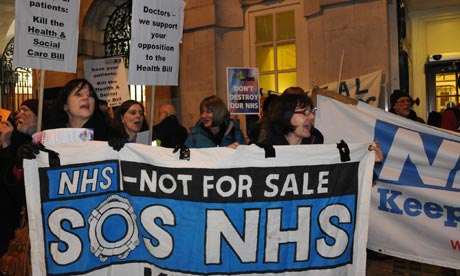
"There are things that people in Britain want provided by the state, and health is one of them. Every opinion poll of the British public shows that. We don't want competing police forces or competing magistrates courts, so why is it planned to compel hospitals to compete with each other?" says Dr Mark Porter, chairman of the British Medical Association's consultants committee.
He reflects the deep anxiety, not just in the BMA but across much of the wider medical establishment, about health secretary Andrew Lansley's imposition of free-market methods in the NHS in England. If the health and social care bill, currently before the Commons, goes through without substantial amendment, then the NHS will be thrust into a new era in which "any willing provider" – NHS organisations, private healthcare firms or charities – can bid for contracts to treat patients. In addition, hospitals will be obliged to compete for patients and all hospitals will have to become foundation trusts, largely and deliberately outside the health secretary's control, by 2014.
Porter is adamant that a healthcare system run on a deliberately competitive basis cannot deliver care of a universally high standard, as the NHS seeks to do. Winners and losers are inevitable. He draws a comparison between healthcare and food supply to illustrate what he sees as the folly of the government's radical restructuring of the NHS.
"It's a bit like supermarkets. Everyone goes to them and everyone understands that if there's a market failure, and the local supermarket closes down, you have to go to a different shop or go further away for your shopping. But people don't want that in healthcare," says Porter.
"People want a choice [of healthcare providers] but they want that choice to include a high-quality local hospital. Most patients most of the time don't want to have to travel to seek quality care. They want that to be available locally, but because the bill proposes that everything is organised to stimulate a market, that brings the risk of 'market failure'."
Porter accepts that the government does not intend the NHS to be damaged by its reforms. But as the NHS budget will remain largely flat in the next few years, if private providers are to start winning contracts then it will inevitably be at the expense of existing NHS providers. The new consortiums of GPs who will decide how £80bn is spent on patients will be obliged to choose whoever offers the best deal, not necessarily their local hospital, or indeed any NHS service at all.
"Having a whole range of competing providers will lead to fragmentation, and if companies start to pick off the services provided by the local hospital it could have a disastrous impact on the hospital's overall stability," he said.
Porter fears that private firms will cherrypick groups of patients with complaints that are easy to treat and leave the NHS to care for patients whose condition makes easy profit impossible: such as most people attending A&E, and those with ongoing medical complications that are the result of chronic conditions requiring regular management, such as obesity, diabetes and heart failure. Remove the money that hospitals currently receive for treating simpler cases and their entire viability could eventually be in peril, Porter warns.
The until-now limited involvement of private firms in the NHS, such as the block contracts Labour awarded such providers to remove cataracts and repair hips and knees, show that profit-focused businesses inevitably want to minimise their risks. If that pattern continues after the proposed reforms take effect in 2013-14 then the NHS, in at least some parts of England, could become "an increasingly tattered safety net", and no longer offer a comprehensive, universal and high-quality service.
"The danger is that we will lose the comprehensive and universal remit of the NHS, not because that's the government's prime intention – it isn't – but because the prime intention is to have a commercially competing market system," says Porter.

